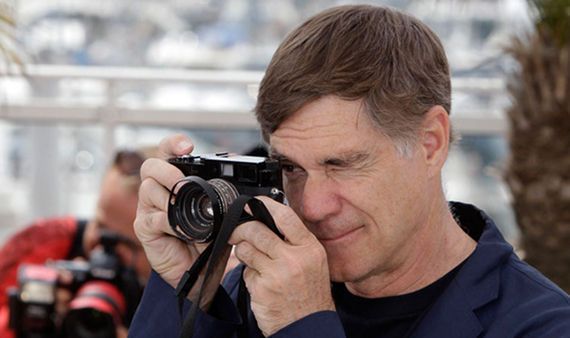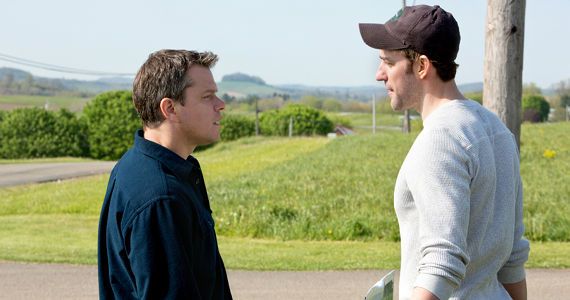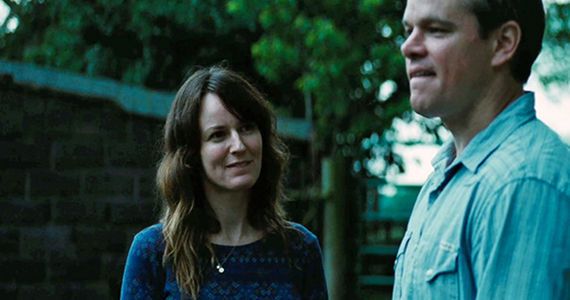Promised Land will mark the third time Gus Van Sant has directed Matt Damon from scripts the actor has co-written. The first time was 15 years ago, when the then-rising star struck gold, winning a coveted Oscar for co-penning Good Will Hunting with his childhood friend, Ben Affleck. Ten years ago, Matt - and this time, Ben's younger brother, Casey - wrote and starred in Gerry, directed by Gus.
Van Sant is a twice Oscar-nominated director (Milk and Good Will Hunting), who wasn't the first choice to direct Matt and his co-star/co-writer John Krasinski in Promised Land. In fact, Matt was slated to direct but had to drop out at the eleventh hour due to a scheduling conflict.
In our interview withMatt Damon he made no bones about feeling utter disappointment about not directing Promised Land, and immediately emailed the script to Van Sant from his plane seat on the runway, where he was about to jet off on a family vacation. Gus immediately responded with a nod. He said: "I was on the lookout for that script before Matt checked in with me that morning; I knew he had a project in the works. When I heard from him, I figured they needed my help."
Van Sant has brought us some of the greatest cinematic classics: Drugstore Cowboy; My Own Private Idaho and Milk. He has a gift for choosing heartfelt human interest stories which resonate with his audience, and Promised Land is no different. The film explores America at the crossroads where big business and the strength of small-town community converge.
From an original story by Dave Eggers (Away We Go, Where the Wild Things Are), the film is set in a rural Pennsylvanian town where the economy has taken a downturn, causing landowners and farmers to face bankruptcy. In rolls Steve Butler (Damon) and his business partner, Sue Thomason (Oscar-winner, Frances McDormand), who are natural gas company reps of Global. They encounter more resistance than they bargained for when trying to buy up drilling rights on the struggling farmers' land.
While the stakes are clearly drawn with the potential of hydraulic fracturing to dilute the local water supply – better known as 'fracking' – the locals are in a moral dilemma: should or shouldn't they sell the land that's been in their families for hundreds of years, in a bid to save themselves from going in the red? The sales executives understand the danger involved in fracking - which includes the injection of chemicals that can ruin fertile ground and cause the death of cattle - but this is obviously downplayed.
It's just a matter of time until they face opposition and they do at the local town meeting when retired schoolteacher, Frank Yates (Oscar nominee, Hal Holbrook) voices his disdain for fracking, and a grassroots campaign, led by Dustin Noble (John Krasinski), suddenly appears to spice things up. And as if Steve's heartstrings needed further tugging, he meets Alice (Rosemarie DeWitt) at the local bar, who also influences his viewpoint.
There has been talk of the film hammering home a political anti-fracking message, however Van Sant states that the film doesn't have a political message and audiences should see this as a 'sign of the times human interest story.' He adds that he didn't know anything about fracking until he read the script:
"Once we were on the set in Pennsylvania you could ask any questions about the topic to whoever was near to you as the subject was very current. Even the guy who rented his house to us had had a lot of exposure. Pittsburgh is a very depressed economy and they were welcoming this business to their community. So there were big conventions about it all over town while we were in pre-production. This is the background of our story and the meat of the story is corporate policy and manipulation and the fracking is a corporation."
We sat down with the To Die For director at the press junket, where he discussed how he hires the locals as extras to give the film that authentic feel, and how Matt hasn't changed since becoming a movie star.
SR: What attracted you to this script?
GVS: About four months earlier, I was reading that Matt was going to direct Ben Affleck. Maybe he was going to have Ben play the lead character in this story? Or it might have been a different project. I remember thinking: "Maybe something will go wrong and they'll need me to help." Sometimes Matt will email me about another project or a script he's considering, which is usually less interesting because he hasn't written it. So this one I knew he had written which is why I thought maybe something will go wrong and I can work on it (Smiles). So when I received the email from him about this movie, I knew that our history and my suggestions had meant a lot to him and I immediately said yes.
SR: Did you know about fracking before reading the screenplay?
GVS: I didn't know about it. Before emailing me the script, Matt called to give me a rundown about hydraulic fracturing which was in the news, but I hadn't heard of it. I had heard of different ways of drilling for oil, but I had never heard of it in these terms of drilling down into the shell. What I learned was basically from the script.
SR: You captured some wonderful performances in the film, how do you set up your scenes?
GVS: I try to get to know the actors as much as I can. I feel like I'm friends with them for starters and for a week or two, we rehearse when they're getting the costumes together. The rest is blocking the scene which usually happens during the morning. Then we just start shooting. I try to shoot the first rehearsal because people are more spontaneous. People in real life don't really know where they are going to be either positioning themselves or how they will be saying their words. When people goof during the first take, it usually looks realistic.
SR: Can you talk about working with Matt again after a decade? He's now a seasoned actor as well as a family man, has he changed at all?
GVS: The differences are that he is older. He seems to be the same person. He's achieved his desire to be a movie star. I think he wanted to literally become a movie star. (Smiles) I think he's always afraid of losing it, so he likes to maintain it. So he's a good interview but he seems the same to me.
SR: Your films have this organic feel to them. What is the key to tapping into this authentic feeling? Is it casting the locals?
GVS: Casting the locals is my primary concern because all the other things you assume will be manageable. Like you'll be able to find a really great gymnasium for the town meeting. You just assume that's going to be okay, so you don't worry about it. I was worried about casting the right background because everything in the script was so immersed in this local town and John and Matt had written it almost like a Normal Rockwell portrait of this town, which scared me.
SR: Movie goers may look at this and think it's a story about corporations. But it isn't. The story has a heart as you creatively elevated the material with your style. Who do you draw from?
GVS: I think it helps to develop a picture in your head while you're reading the script and you're thinking about stuff you've done before, or things you've seen. In the case of this movie, one of our references … (Gus's cell rings) … It's my agent. I will put her on speaker phone and let you hear it… "Hello… there are some people recording you right now.."
Agent: "Then I'm going to hang up!"
GVS: "She must have some top secret information." (Laughter)
To answer your question, we watched Bertolucci and 'Little Buddha'. Our movie didn’t look like anything like his work, but we liked the color and the cinematography. We actually bought a crane similar to the one Storaro would use. We were mostly interested in the moves. And then we never used it, because it's hard to make use of it unless you have a lot of room. We couldn't use it in the bar. We generally used a regular dolly. No matter how influenced you are by somebody as specific as Bertolucci and Storaro working together, you will end up with something completely different. So it ends up being its own thing, of which you want it to be anyway.
SR: Did the fracking people ever try to shut you down at all?
GVS: I heard a rumor of one person coming to the office and saying what we were doing was really bad, but not really. We thought we may be picketed but we weren't. In fact we had a lot of sympathy from people living in the towns we were shooting in, because they understood that our film was a dialogue and wasn't trying to demonize hydraulic fracking.
Promised Land is now in theaters.



